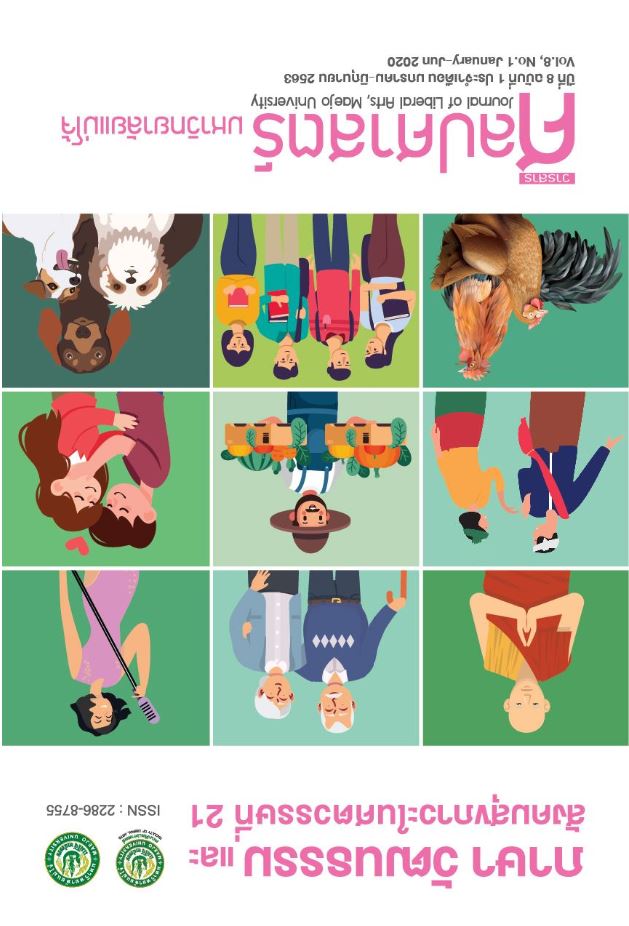A Self-Sufficiency Economy Lifestyle of The Prime Minister’s Officer
Main Article Content
Abstract
The purposes of this research are: 1) to study the level of knowledge and understanding about Sufficiency Economy Philosophy among personnel of the Prime Minister's Office, and 2) to study the level of living behavior according to sufficiency economy philosophy among personnel of the Prime Minister's Office. The sampling groups were composed of 245 in Office on the Way of Self-Sufficiency Economy. Data were collected through a 5-scale rating questionnaire. The statistics employed for data analysis were frequency, percentage, mean, standard deviation, t-test, F-test or One Way ANOVA. The results of the research were as follows: 1) the personnel in the Office of the Prime Minister have a level of knowledge and understanding about the philosophy of the sufficiency economy. The overall picture is in a high level. The level of knowledge and understanding about the philosophy of the sufficiency economy classified by personal factors, is at a high level, aswell.
2) The personnel in the Office of the Prime Minister have is a level of behavior in living according to the philosophy of sufficiency economy. The overall picture is in a high level and when comparing the levels of lifestyle behaviors according to the philosophy of sufficiency economy of personnel, Office on the Way of Self-Sufficiency Economy, the Prime Minister's Office classified by personal factors. Found that the personnel of the Office of the Prime Minister have different personal factors. There is a significant difference in the level of living behavior according to the philosophy of the sufficiency economy at the level of .05
Article Details
References
จิรายุ อิศรางกูร ณ อยุธยา. (2549). เศรษฐกิจพอเพียงตามแนวพระราชดำริ. วารสารอันเนื่องมาจาก พระราชดำริ. 4, 27-28.
นภาพรรณ วงศ์มณี. (2553). การนำแนวปฏิบัติตามปรัชญาเศรษฐกิจพอเพียงไปใช้ในการดำเนินชีวิตของประชาชน: กรณีศึกษาชุมชนทรายทอง ตำบลเจริญเมือง อำเภอพาน จังหวัดเชียงราย (วิทยานิพนธ์ปริญญามหาบัณฑิต). เพชรบุรี: มหาวิทยาลัยศิลปากร.
ปริศนา โลมากุล. (2558). การประยุกต์ใช้แนวคิดเศรษฐกิจพอเพียงในชีวิตประจำวันของประชาชนในอำเภอศรีราชา จังหวัดชลบุรี (วิทยานิพนธ์ปริญญามหาบัณฑิต). ชลบุรี: มหาวิทยาลัยบูรพา.
วรท แสงสว่างวัฒนะ. (2558). รูปแบบการดำเนินชีวิตและแรงจูงใจที่ส่งผลต่อการตัดสินใจใช้บริการสถานที่ออกกำลังกายของกลุ่มผู้บริโภคที่เคยใช้บริการสถานที่ออกกำลังกายในเขตกรุงเทพมหานคร (วิทยานิพนธ์ปริญญามหาบัณฑิต).กรุงเทพมหานคร: มหาวิทยาลัยกรุงเทพ.
วิวัฒน์ ศัลยกำธร. (2552). ศูนย์เรียนรู้ทางไกลเศรษฐกิจพอเพียง. กรุงเทพมหานคร: มหาวิทยาลัยสุโขทัยธรรมมาธราช.
ศศิเพ็ญ พวงสายใจ, วัชรี พฤกษิกานนท์, พรทิพย์ เธียรธีรวิทย์, สุขุม พันธุ์ณรงค์, และพิมลพรรณ
บุญยะเสนา. (2554). การประเมินผลเปรียบเทียบในมิติต่าง ๆ ของประชาชน การนำปรัชญาเศรษฐกิจพอเพียงมาประยุกต์ใช้. เชียงใหม่: ศูนย์วิจัยและพัฒนาเศรษฐกิจชุมชน คณะเศรษฐศาสตร์ มหาวิทยาลัยเชียงใหม่.
สมพร เทพสิทธา. (2550). ดวงประทีปจากพระบรมราโชวาท พระบาทสมเด็จพระเจ้าอยู่หัว. กรุงเทพมหานคร: บริษัท พิมพ์สวย จำกัด.
สำนักงานคณะกรรมการพัฒนาการเศรษฐกิจและสังคมแห่งชาติ. (2550). แผนพัฒนาเศรษฐกิจและสังคมแห่งชาติ ฉบับที่ 10 (พ.ศ. 2550-2554).
สำนักงานคณะกรรมการพิเศษเพื่อประสานงานโครงการอันเนื่องมาจากพระราชดำริ. (2548). พึ่งตนเอง. วารสารอันเนื่องมาจากพระราชดำริ. 4, 27-29.
สำนักงานปลัดสำนักนายกรัฐมนตรี. (2562). โครงสร้างสำนักงานปลัดสำนักนายกรัฐมนตรี. (ม.ป.ท.)
สุภัทรา บุญปัญญโรจน์. (2550). แนวคิดเศรษฐกิจพอเพียง. กรุงเทพมหานคร: มติชน.

